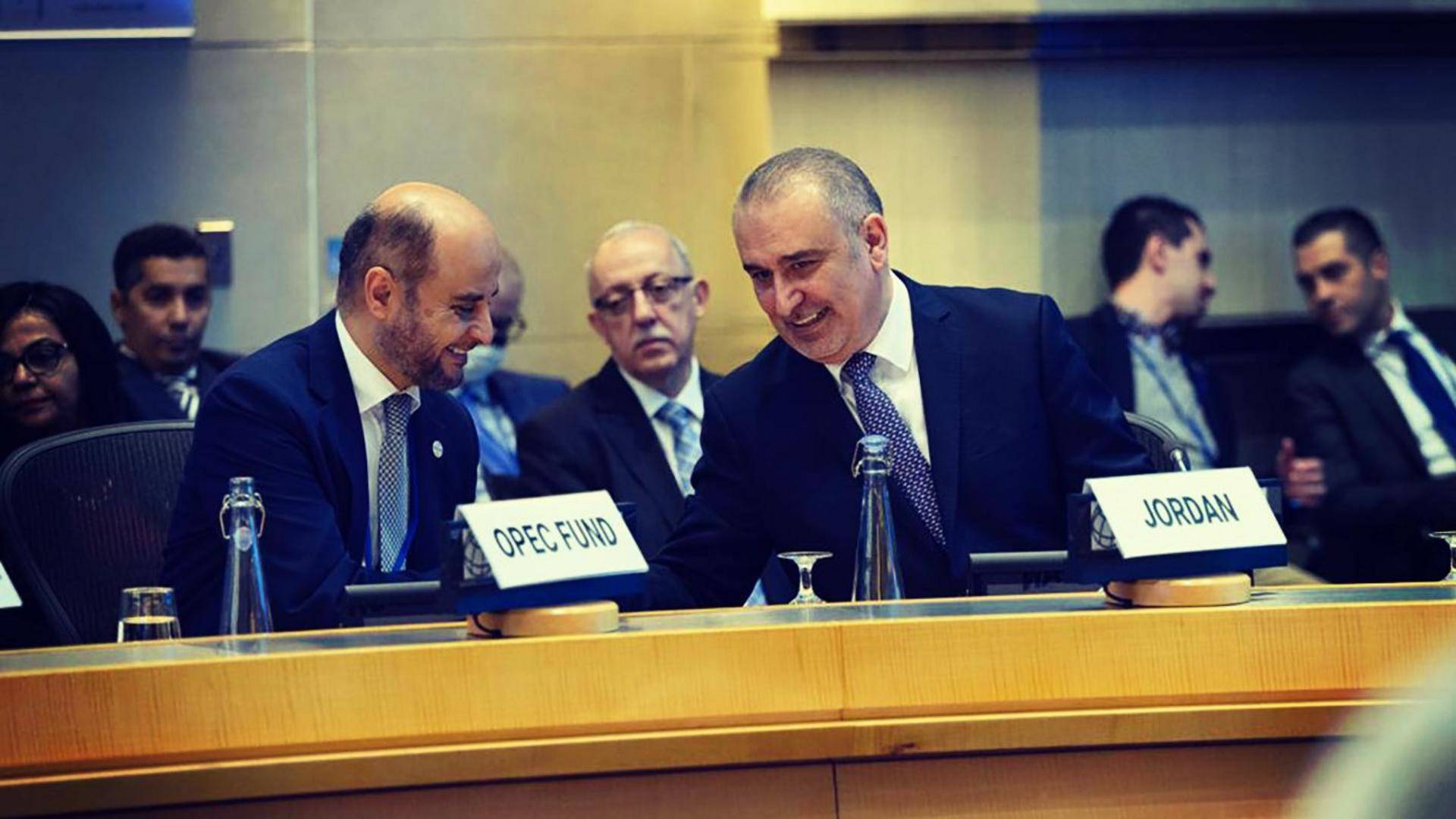We use Cookies. Read our Terms
- News
- OPEC Fund In Washington: “It’s Good To Reconnect”
OPEC Fund In Washington: “It’s Good To Reconnect”
Director-General Dr. Alkhalifa leads a delegation to the first in-person World Bank/IMF Annual Meetings since 2019

Photo: World Bank
For OPEC Fund Director-General Dr. Abdulhamid Alkhalifa it clearly was a homecoming: For the first time in three years, the 2022 World Bank/IMF Annual Meetings in Washington, DC took place in person: “It is good to reconnect,” the Director-General said when he opened a meeting with the World Bank’s Vice President for Latin America and the Caribbean Carlos Felipe Jaramillo. The feeling was mutual: “Seeing each other in person makes all the difference,” Vice President Jaramillo responded.
It was here in Washington that Dr. Alkhalifa at an earlier stage of his career had served in various leadership positions at the World Bank. He left a lasting impression. Rushing along the endless corridors of the so-called Main Complex and directing his delegation adroitly through the maze of offices, meeting rooms and service areas, he was constantly stopped by fellow heads of institutions and former colleagues for a quick hello, a cordial word or a warm handshake.
This did not distract the OPEC Fund head from his mission to strengthen the cooperation between development institutions, partner countries and private sector investors and lift joint efforts to a new level: “As we are confronted with global challenges, we must find global responses. We must join forces to overcome the multiple crises the world is facing and at the same time not lose sight of the indispensable goal of sustainable development,” he said.
Pursuing this goal the OPEC Fund delegation had numerous meetings with governments as well as with the leadership of the World Bank, the International Finance Corporation (IFC), the International Fund for Agricultural Development (IFAD), the Black Sea Trade and Development Bank, the Dutch development bank FMO, the German development bank DEG and Afreximbank. Bilateral meetings included the governments of Bahrain, Georgia, Guatemala, Kazakhstan and Libya.
The OPEC Fund Director-General was also invited to speak at a round table on developments and challenges facing the Middle East and North Africa region. In his intervention he focused on how to bridge the gap between energy poverty and climate action: “We can take a major step forward with improvements of energy efficiency. But to reach the climate goals we need to drastically increase the output from renewable sources of energy,” he said.
While climate action was a major topic in many discussions the OPEC Fund delegation held in Washington, many other pertinent issues were discussed too. Food security and public health were the key issues in a conversation with World Bank Vice President Eastern & Southern Africa Victoria Kwakwa, while the meeting with Vice President Jaramillo focused on ways to overcome the infrastructure gap. Despite repeated warnings – most recently by the Organisation for Economic Co-operation and Development (OECD) – that the deficit in the sector is increasing rapidly, action is difficult to mobilize. The global economic downturn, soaring inflation and strained public finances are causing additional obstacles for the delivery of urgently needed investments.
Meetings with the World Bank Vice President for South Asia, Martin Raiser, and East Asia & Pacific Vice President, Manuela Ferro, were carefully prepared with the goal to raise the OPEC Fund’s profile and increase its business activities in the region. All sides agreed that development support must be delivered in a fast and targeted way, but without compromising essential regulations and safeguards. “Working together, we can maximize our impact,” the Director- General said.
The World Bank/IMF Annual Meetings also attracted financial institutions and private investors back to Washington. The OPEC Fund took advantage of this and held several meetings led by Assistant Director-General Financial Operations Tarek Sherlala with investment banks. The conversations provided important updates for the OPEC Fund’s future financing plans.
Streamlining processes can contribute to lower transaction costs and deliver more impact, everybody agreed. Dr. Alkhalifa translated this into an ambitious target for the OPEC Fund: “We should put in our KPIs how much we can leverage from other sources for each dollar that we spend from our own resources. One dollar committed must be one dollar delivered.”
It was not only the personal chemistry that created a close bond between many participants at the meetings in Washington. More than anything, the discussions were shaped by a shared sense of responsibility to provide leadership at a time of unprecedented challenges. It was this spirit that allowed the OPEC Fund Director-General to draw a positive conclusion: “There is real appetite to enhance development work, especially on the three most pressing subjects: climate change, energy poverty and food insecurity,” Dr. Alkhalifa said.
He added: “But our work must not be limited to those areas alone. Development work needs to have a long-term view and needs to address the structural deficiencies and gaps that are holding back the well-being of so many people.” With a strong result in 2022 and ambitious plans going forward the OPEC Fund is well placed to make a sizeable contribution.